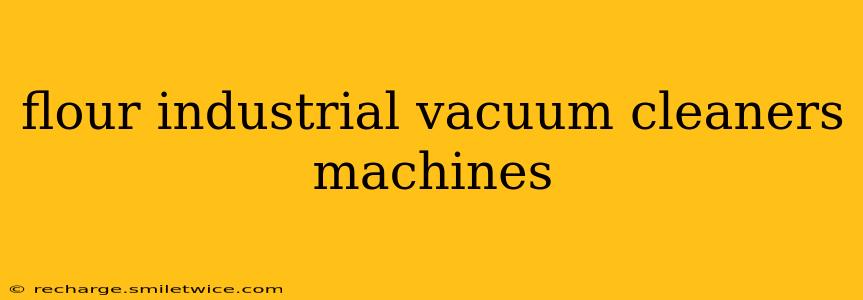Flour dust presents significant challenges in industrial settings. Not only is it a nuisance, creating a messy and inefficient workspace, but it also poses serious health and safety risks, including explosion hazards. This is where industrial vacuum cleaners specifically designed for flour handling become essential. This article explores the crucial role of these specialized machines in maintaining a clean, safe, and productive flour milling or processing environment. We'll delve into various aspects, answering common questions to provide a comprehensive understanding of this vital equipment.
What are the key features of flour industrial vacuum cleaners?
Flour industrial vacuum cleaners differ significantly from standard vacuum cleaners. They are engineered to handle the unique properties of flour, which include its fine particle size, tendency to create static electricity, and potential for explosion. Key features include:
-
High-efficiency filtration: These machines utilize HEPA (High-Efficiency Particulate Air) or ULPA (Ultra-Low Penetration Air) filtration systems to capture even the finest flour particles, preventing dust from escaping back into the environment. This is crucial for maintaining air quality and preventing health problems.
-
Explosion-proof design: Many models incorporate explosion-proof motors and components, designed to mitigate the risk of dust explosions. This is a critical safety feature in flour milling environments.
-
Durable construction: Built to withstand the rigors of industrial use, these vacuums are typically made from robust materials resistant to abrasion and flour buildup.
-
Powerful suction: Strong suction is essential for effectively removing flour dust from various surfaces and equipment.
-
Easy cleaning and maintenance: Efficient cleaning and maintenance mechanisms are vital for minimizing downtime and ensuring the machine's long-term performance. Many incorporate self-cleaning features or easy-to-access filter systems.
What types of flour industrial vacuum cleaners are available?
Several types of industrial vacuum cleaners cater to the specific needs of flour handling:
-
Central vacuum systems: These are large-scale systems that efficiently collect dust from multiple points throughout a facility, often connected to a central collection point.
-
Portable vacuum cleaners: Smaller, more mobile units ideal for spot cleaning and smaller areas.
-
Wet/dry vacuum cleaners: Capable of handling both dry flour dust and liquid spills, offering versatile cleaning solutions.
-
Explosion-proof vacuum cleaners: These are specifically designed to prevent dust explosions.
How do flour industrial vacuum cleaners prevent dust explosions?
Dust explosions in flour mills are a significant concern. Industrial vacuum cleaners designed for flour handling employ several strategies to minimize this risk:
- Explosion-proof motors and components: Certified to withstand potential explosions.
- Effective dust collection and filtration: Preventing the accumulation of flammable dust clouds.
- Regular maintenance and cleaning: Preventing dust buildup within the vacuum cleaner itself.
- Grounding and bonding: Reducing the risk of static electricity buildup.
What are the benefits of using flour industrial vacuum cleaners?
The benefits extend beyond just cleanliness:
- Improved worker health and safety: Reduced exposure to flour dust minimizes respiratory problems and other health risks.
- Enhanced productivity: A clean workspace allows for more efficient operations.
- Reduced fire and explosion risks: Proper dust control significantly mitigates the hazards associated with flammable flour dust.
- Better product quality: Reduced contamination from dust improves the quality of the final product.
- Compliance with safety regulations: Using appropriate vacuum cleaners ensures compliance with industry safety standards.
How often should I maintain my flour industrial vacuum cleaner?
Regular maintenance is crucial for optimal performance and safety. A schedule should be developed based on usage, but generally includes:
- Daily checks: Inspecting filters, hoses, and other components for damage or blockages.
- Regular filter cleaning or replacement: Following the manufacturer's recommendations.
- Periodic emptying of the dust collection container: Preventing overflow and potential hazards.
- Professional servicing: Scheduling professional maintenance checks according to the manufacturer's guidelines.
By investing in appropriate flour industrial vacuum cleaners and implementing a comprehensive cleaning and maintenance program, flour mills and processing facilities can significantly enhance workplace safety, improve operational efficiency, and protect the quality of their products. Remember to always consult with a safety professional and adhere to all relevant industry regulations when choosing and operating these essential machines.
